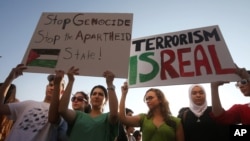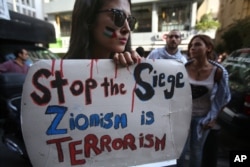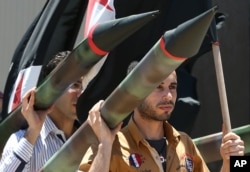Lebanon’s normally highly divisive television stations have joined together to express their support for the Palestinian cause in Gaza by airing a joint newscast entitled, “Palestine, you are not alone.”
The highly emotive half-an-hour program on Monday morning by the eight major local television outlets controlled by different antagonistic sects and political groups - including Shi'ite Hezbollah and its Sunni opponent the Future Movement - contained images of Israeli airstrikes, Palestinian mothers mourning over the bodies of their children, and Gaza homes pounded into rubble.
The joint newscast - billed as the Arab world’s first unified news bulletin in support of the Hamas-controlled Gaza Strip - began and concluded with a poem by the late Palestinian poet Mahmoud Darwish.
Each station contributed its own report with all airing the final bulletins exploring different aspects of the conflict raging in Gaza.
“It is simply an attempt to express, through our visual media channels, the Lebanese people’s solidarity with the people of Gaza, who live under a cruel siege and whose innocent civilians are being killed every day,” said Talal Salman, editor of the Lebanon’s As-Safir newspaper, who proposed the joint broadcast.
The broadcast illustrates the breadth of opposition in Lebanon to Israel’s offensive in the Gaza, analysts say.
Muted disapproval
Still, public displays of support for Hamas or disapproval of Israel appear more muted than in 2009, the last time Israel launched a major offensive in the Gaza in retaliation for Palestinian rocket attacks on southern Israel.
Small crowds of placard-waving protesters rallied at demonstrations Tuesday across Lebanon condemning the Israeli offensive. The low attendance reflects the high level of anxiety among Lebanese that the conflict raging to their south could draw Lebanon in and trigger Hezbollah’s entry into the fray and a repeat of the Shi'ite movement’s 2006 war with Israel.
The Lebanese are already suffering spillover from the civil war raging in next-door Syria with suicide bombings by jihadists and episodic but intense violence in the northern city of Tripoli.
The deepest support for Gaza in Lebanon is on display in the dozen camps housing 400,000 Palestinians. The camps were set up for Palestinian refugees fleeing the 1948 Arab-Israeli war.
Blood drive
At the largest, Ain al-Hilweh near the southern city of Sidon, activists have launched a blood drive for Gaza and a campaign to collect money.
The campaign is supported also by officials from Fatah, the faction of the Palestine Liberation Organization, that is a rival to Hamas. Blood donations from the camp are being given to the International Committee of the Red Cross for onward delivery.
“The least we can do is donate blood to our families and the people in Gaza,” Fouad Othman of the Democratic Front for the Liberation of Palestine told local reporters.
Camp residents have been rallying in protests and large screens have been erected in the camp and in the evening play pro-Hamas videos and bulletins showing Israeli strikes on Gaza.
Military parade
Last week, one Palestinian faction organized a military parade in the camp displaying replicas of the homemade rockets Hamas has been firing at Israel.
Nidal Othman, a Palestinian activist, said the parade was a display of the Palestinians’ “legendary resilience.” He condemned what he sees as muted support across the Arab world for Hamas.
“It is this legendary resilience that Israel is unable to break with the power of aerial weapons and all its destructive and criminal weapons,” he said.
Lebanese authorities are keen to make sure support for Gaza is limited just to symbolism. So too is Hezbollah, which has offered strong rhetorical support for Hamas but appears reluctant to join in and fight Israel.
Sporadic rocket attacks
Lebanese security forces are mounting operations to try to stop militants firing sporadic rockets from southern Lebanon into Israel and on Monday they arrested the suspected ringleader behind some rocket attacks earlier this month.
Pro-Gaza militants launched salvoes of rockets from Lebanese territory toward Israel on several occasions last week. In turn Israel launched retaliatory shelling of Lebanese villages along the border.
Lebanese authorities fear rising escalation of the exchanges.
A week after Israel launched airstrikes on Hamas positions in Gaza, Lebanon filed a complaint with the United Nations Security Council over Israeli violations of Lebanese airspace.
Among them was a 21-155-millimeter artillery bombardment on July 11 on the outskirts of the southern Lebanese town of Kfarshouba and a 31-shell salvo on July 14 on the villages of al-Qlayleh and al-Maaliyeh.
In a statement the Lebanese government said: “The firing of rockets by some individuals or by unorganized or marginal groups does not serve the interest of Lebanon or of the Palestinian resistance in Gaza.”
It warned that rocket attacks launched from Lebanon give Israel excuses to retaliate.






